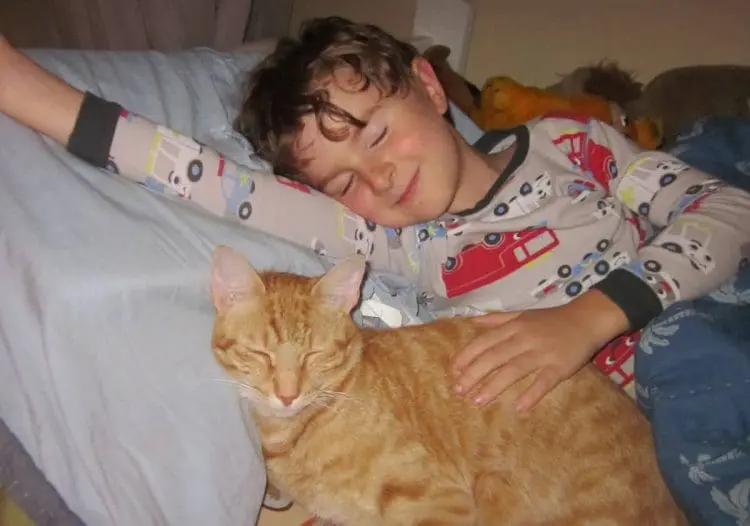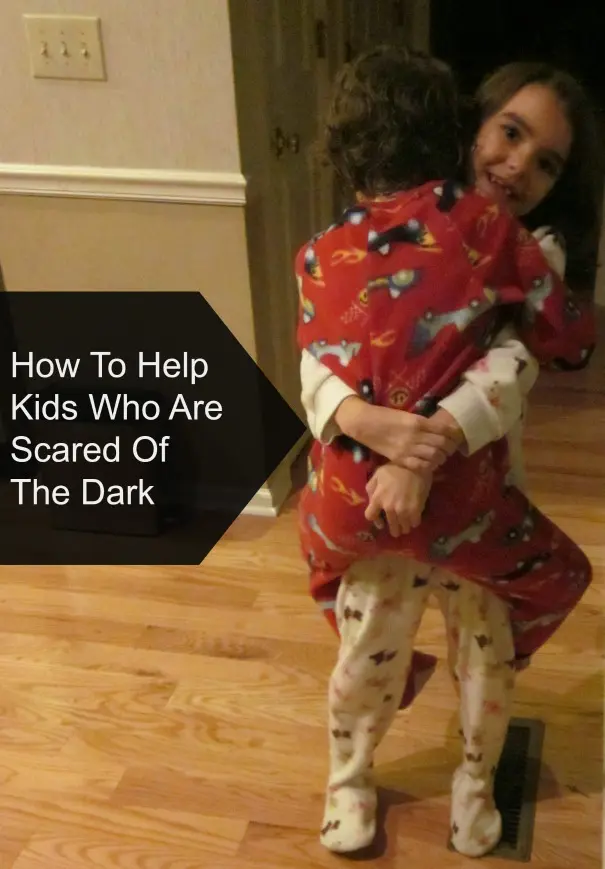Somewhere after the long days and months of late-night feedings and diaper changes, and dealing with crying babies, you might experience a new kind of trial. Young children are often afraid of the dark. This fear primarily manifest itself as a kid who doesn’t want to go to sleep. The question then becomes why are kids scared of the dark and how to help them get over fear of the dark. Don’t worry this is a phase that can be handled so you can both get back to your respective beds! Here is advice to share with your children on how to not be scared of the dark.
Why are kids scared of the dark?
You’ve probably seen movies, where there’s a young child who’s absolutely convinced that a monster is hiding in his closet or under his bed, and refuses to go to sleep. It turns out that kids often have a fear of the dark and/or a fear of monsters hiding under the bed. This means they they often don’t want to go to bed by themselves or at least without a light on. It seems to be a common phase most children go through. Why is this the case?
Well, darkness means we have very limited visibility. This is where the fear begins to creep in. I remember thinking I won’t be able to see what is coming for me. This is precisely the reason that fear of the dark seems to be hardwired into us. In fact, according to Science Alert, “our fear of the dark is an evolutionary trait that we picked up to survive real-life predators stalking the night”. This means it is entirely natural and normal for kids to be scared of the dark.
Add to their fear of the dark the fact that children have excellent imaginations and you can see how they may imagine that the darkness is concealing monsters or attackers. Their minds create excellent realistic images of the things they think of. This can be very frightening for kids to overcome. They feel they need a light or an adult to protect them from lurks in the darkness. Extra sources of darkness and fear maybe the closet or under the bed.
Secrets For How To Not Be Scared Of The Dark
If this all sounds familiar, I have some advice on how to deal with kids who are scared of the dark. They need reassurance that this is a normal phase they will get past. You can explain to them that you will help your child overcome their fear of the dark. Tell them you will share your secrets for how to not be scared of the dark. This will help them buy into the whole process.
Take Comfort: It’s Probably Just a Short Phase
Fear of the dark is a common developmental stage for many children. It typically emerges around the age of 2 or 3 and may continue into the early school years. The fear often peaks between ages 4 and 6 but can persist for some children into later childhood. Most children are only scared of the dark for a short phase. However, it may feel like an eternity when you are currently living it. Luckily most kids, find this is a short stage that they’ll grow out of. But there are still things you can do to help them get over their fear of the dark.
A big reason why kids end up scared of the dark, or believing there are monsters under the bed, is because they have wild, active imaginations. It’s not hard to believe that the rough, dark outline of a sweater is actually a terrifying goblin ready to strike. That is, if you’re a toddler.
I found that one of the best things to do is to stick to only calm, soothing TV shows and entertainment before bed. It should be happy, upbeat stuff. Have you ever noticed how dark and scary most Disney movies are in some places? When they lay down for bed, they will likely begin to think of the things they saw or read during the day. So make sure they are getting activities right before bed.
Only say calming things right before bed. Leave off things like, “Don’t let the bed bugs bite.” Don’t say things like, “You have a big day tomorrow.” Try things like “Sweet dreams.” Say things like, “I love you and I will see you in the morning.”

How to get over fear of the dark with a bedtime routine that works!
It’s essential for parents and caregivers to acknowledge and address these fears with empathy and understanding. Strategies to help children overcome the fear of the dark include:
Create a bedtime routine.
Setting up a bedtime routine is crucial. What you do here is up to you, but some ideas could be: a nice bedtime story, a warm bubble bath, singing lullabies and even just sitting in bed with him until he falls asleep. A consistent bedtime routine works wonders!
Here are several more ideas for you if you need some extra help. Try them out and see which work for you.
Get a night light.
A nightlight can do wonders for making them feel more secure and lessen their fear of the unkown. They’re really cheap and you can find one at Target, Walmart, or even a dollar store for a few bucks. You can also try a motion activated night light so it only comes on if something moves. Nothing is moving if it is not on! Or a solar powered one that will cut on and off automatically with the darkness is great for older children who still need a bit of reassurance.
Leave the door ajar.
Leaving the door open slightly could be helpful if they have trouble falling asleep. Not being completely isolated in the room does a lot to ease their anxiety and worries.
Play soothing music.
Soft, gentle music or using a nice sound machine can help, too. Complete silence can make matters much worse for a kid who’s scared of the dark. Soothing music can help keep their imaginations calm.
Sleep training clock.
These types of clocks feature lights that tell kids when it is time to get up and time to sleep (parent sets those times). They also have night lights and soothing music built in so they perform many functions at once. The Mella Ready to Rise Children’s Sleep Trainer clock is the most popular on Amazon and has a 4.5 star rating with almost 15,000 reviews. Affiliate link.
Reassure them.
Simply tell them that there’s nothing to be scared of. There are no monsters or demons lurking in their bedroom, and nothing is going to hurt them. You are right next door if they really need you.
Calm them.
Use DIY lavender pillow spray to help them feel calm and relaxed and talk them for a bit as they get sleepy.
Give them a stuffed animal.
A stuffed animal can sometimes serve as a trusted friend to watch over them and keep them safe. Plus, just cuddling will help them feel soothed. If you happen to have a cooperative cat or dog, they may serve to make your child feel less alone and vulnerable.
Set Up A Check Up. Tell them you’ll come to check on them every 5 minutes. Then, you start to space it out more: to 10 minutes, then 15 minutes, and hopefully they’ll be asleep before long.
Share the bed, if need be.
Letting them share a bed with you isn’t always an awful idea. As long as it doesn’t get out of hand. A better idea is to stay in their bedroom. That way, they don’t get used to the idea of staying in yours. You can leave when they fall asleep and you are reinforcing the idea that there’s nothing to be scared of in their room.
Summing Up Ideas To Conquer Night Fears
In conclusion, nighttime fears are very common in young children, and sometimes there’s nothing we can do to make them go away. For most kids, it’s just a phase they’ll quickly grow out of. We just need to help them along the way a little bit. Just try to have patience and not loose your cool. I know it can be frustrating to deal with, but it’s important to keep calm. Don’t get upset at your son or daughter! With a little patience and understanding, and positive reinforcement, I’m sure they’ll be over their fears before you know it!
Remember that each child is unique, and what works for one may not work for another. It’s essential to be patient, supportive, and understanding as children navigate and eventually overcome their fear of the dark. If the fear persists or significantly interferes with a child’s daily life, seeking guidance from a pediatrician or child psychologist may be beneficial.
Do you have any other tips or tricks to help toddlers who are scared of the dark? I’d love to hear them in the comments!
Related Posts:


Kristen says
We love the MY TOT CLOCK – it keeps them in their beds and a great night light! Pinned and stumbled!
Laura says
Great topic to cover. We talk about this exact subject in our parenting classes and it’s always great to be able to share some links to great articles that the class can read. And I agree that patience and positive reinforcement is key for success.